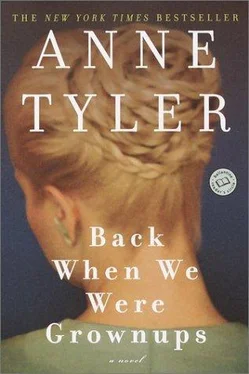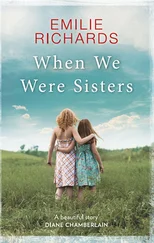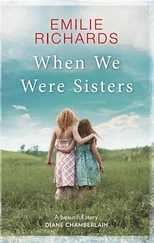“Where was I? Myrtle’s Family Restaurant,” Rebecca said. She speared an olive. “Oh, doesn’t it seem long ago? But of course, it was long ago. And yet, in another way… I can remember just like yesterday that time in ninth grade when we went to the drive-in movie. I had such a crush on you, and you thought we were just friends. You thought I was only this kid you’d gone to nursery school with.”
The olive had a pit, she discovered as she bit down. She removed it with a thumb and forefinger and hid it under her roll. Luckily, Will’s eyes were on his plate and he didn’t seem to notice.
“A bunch of us went to the movies,” she said, “in Ben Biddix’s older brother’s pickup truck. Remember? Ben paid his brother five dollars to take us since none of us could drive yet. And we all sat out on that grassy spot down in front of the screen — do you remember this?”
Will shook his head.
“It was you and me and the Nolan twins and Ben and his brother and Nita Soames, who was going out with Ben’s brother at the time. In fact I think she eventually married him. The night was really clear and warm with a balmy breeze, a kind of promising breeze, you know that kind? You were sitting next to me and I put my hand down flat in the grass, hoping to seem nonchalant, and then I inched it a little closer to your hand and waited, and then a little closer; so finally just the sides of our hands were barely touching, or maybe not even touching but warming each other, sort of—”
“You broke my heart,” Will said.
All this time he’d gone on gazing at his plate, keeping his face so impassive that she wasn’t sure he was listening. And she wasn’t sure even now, because there she was, magically transported to that starlit evening in 1960 when everything was poised to begin, and meanwhile he had leapt forward to the very end of the story. She set down her fork. The olive was sitting high in her throat like a thick, heavy stone.
“You never gave me the slightest warning,” Will said. He took hold of both sides of the table. “I thought everything was fine. I trusted you. Then one day you said goodbye and walked out, not a word about why. Got married two weeks later. I had to hear it from my mother. ‘Did you know about this person?’ she asked me. ‘He must have been in the picture for quite some time,’ she told me. ‘Rebecca can’t have been dating him only two weeks, I shouldn’t think.’”
As he spoke, he leaned toward her until he was hugging the table between his sprawling arms. It made Rebecca see, at long last, that this really was Will Allenby — a lanky, big-eared giraffe of a boy who never had quite learned how to manage his own limbs. Those were his startling eyes, whose clear blue light she only now detected underneath the shelter of his thatched brows. And his wide, sharp shoulders, and his boxy Adam’s apple bobbing in his neck. Looking at him was like looking at changeable taffeta — back and forth between the generic old man and the specific young Will. Which made it all the worse that he sounded so bitter.
She said, “Will. I’m sorry. I know I didn’t treat you well. But it wasn’t anything I planned! I was just… overwhelmed! Swept off my feet by a fully grown man, someone who already had his life in order, was already living his life, while you and I were still… but I never meant to hurt you. I hope you can believe that.”
The waiter said, “Is everything to your liking, folks?”
“Yes, delicious,” Rebecca said. “Then afterwards,” she told Will, “after I was married and settled, I know I should have written or something. Offered more of an explanation. But everything started moving so fast! Everything was so chaotic! I had the three little girls to take care of and more and more of the business falling on my shoulders; I was living in that crowded house with my ailing mother-in-law and an uncle-in-law in mourning and a very adolescent brother-in-law; and then my own baby came along. There wasn’t a moment to think, even, let alone write you a letter! It seemed I got onto a whole different path, got farther and farther away from my original self. But just this summer I sort of… woke up. I looked around me; I said, Who have I turned into? What’s become of me? Why am I behaving like this? I’m an impostor in my own life! Or another way I could put it is, it’s not my own life. It’s somebody else’s. And that’s the reason I phoned you.”
Will straightened slowly in his seat until he was upright again. He said, “I guess you thought you could waltz on back as if you’d never left.”
“I didn’t think that!”
“You thought I’d say, ‘Oh, sure, Rebecca, I forgive you. I’ve forgotten all about what you did. Let’s go back to the old days.’”
“I never thought any such thing,” she said.
But she had, in fact. Secretly, she had fantasized that he might say he’d never stopped loving her. Now that seemed conceited, and self-deluding, and shameful.
She slid back her chair and stood up in a rush, bruising both of her thighs against the underside of the table. “Sorry,” she told him. “I can see this has been a mistake.”
She collected her purse and walked out. He didn’t try to stop her.
* * *
All the way home she talked to herself, and shook her head, and blinked back angry tears. “How could I have been so stupid?” she asked. “So outspoken? So forward?” She turned the air-conditioning higher. Her face was filmed with a layer of sweat as slick and tight as shrink-wrap. “But why did he say he’d meet me, if that was the way he felt? Why did he phone me back, even? Oh,” she wailed, “and I should have paid half of the dinner check!” She risked a glance toward the rearview mirror. She decided that her two fans of hair made her look like a Texas longhorn.
Baltimore was solid and familiar and reassuring, its buildings twinkling with safety lights. She rolled her window down and breathed in the sooty petroleum smell, which struck her as refreshing. And the windows of the Open Arms, when she pulled up, glowed so kindly. She parked and unfolded herself from the car. Her skirt was as wrinkled as wastepaper. The colors of her outfit — red, white, and blue, for Lord’s sake! — reminded her of that cheap disposable picnic ware intended for the Fourth of July.
She climbed the front steps and unlocked the door. “I’m home!” she called.
“Hah?” Poppy said from upstairs. She heard laughter on the TV — a sound that ordinarily grated against her nerves, but tonight she found it cozy.
She went straight to the kitchen and set down her purse and looked for something to eat. Standing in front of the open fridge, she devoured two chicken legs, the last of a pasta salad, and several cherry tomatoes. She polished off a container of coleslaw and half a jar of crab-apple rings left over from Thanksgiving. She was so hungry she felt hollow. It seemed no amount of food could ever fill her.
Early on the last Wednesday morning in August, Joey and Lateesha rang Rebecca’s doorbell. Lateesha was carrying the pink crib pillow she never slept without, and both children wore knapsacks. Behind them stood Hakim — a considerable distance behind, all the way out on the curb, almost back in his car already. “I take Min Foo to the hospital!” he shouted. “The pains are five minutes apart!”
“All right! Good luck!” Rebecca said, and she blew a kiss to Min Foo. “Just remind yourself, sweetheart, you’re going to get a baby out of this!”
Min Foo said, “What? Well, yes . The kids haven’t had breakfast yet, Mom.”
“I’ll see to it,” Rebecca promised, laying an arm around each child.
As soon as the car had driven off, she led the children upstairs to the third-floor guest room. “Isn’t this exciting?” she asked as she helped Lateesha shuck her knapsack. “By lunchtime, I bet, you’ll have a brand-new brother or sister!”
Читать дальше












